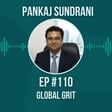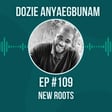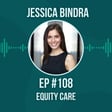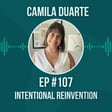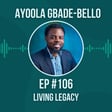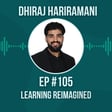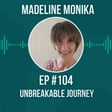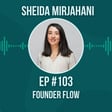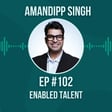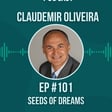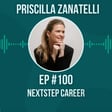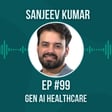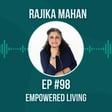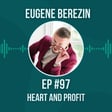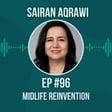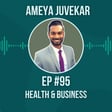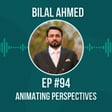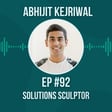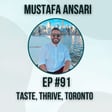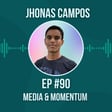Become a Creator today!Start creating today - Share your story with the world!
Start for free
00:00:00
00:00:01

#67 Cultivating Success w/ Julie Smolyansky
Julie Smolyansky, is a soviet immigrant that became the youngest female CEO of a publicly held firm when she took over Lifeway Foods at the age of 27 in 2002. Since then, Julie has continued the company’s growth trajectory with creative product development and marketing to bring kefir, the company’s flagship product, into the U.S. mainstream. Under Julie’s leadership, Lifeway’s annual revenues have grown from $12 million to more than $140 million in 2022, and distribution has expanded beyond the United States to Mexico, Ireland, France, Central and South America, and the Caribbean.
Recommended
Transcript
Introduction to Find A Way Podcast
00:00:02
Speaker
Welcome to the Find A Way podcast, where we celebrate the remarkable journeys of immigrant entrepreneurs who have founded startups in North America.
00:00:12
Speaker
And we are your hosts, Beatriz Anatelli and Ingrid Polini.
00:00:17
Speaker
Join us as we dive deep into the personal stories of these inspiring individuals, exploring their challenges, triumphs, and the diverse range of innovative companies they have built.
Julie's Rise as CEO of Lifeway Foods
00:00:32
Speaker
This is episode number 67, Cultivating Success.
00:00:35
Speaker
Today, our guest is Julie Smolenski.
00:00:38
Speaker
Julie Smolenski is a Soviet immigrant that became the youngest female CEO of a publicly held firm when she took over Lifeway Foods at the age of 27 in 2002.
00:00:48
Speaker
Since then, Julie has continued the company's growth trajectory with creative product development and marketing to bring Kefir, the company's flagship product, into the U.S. mainstream.
00:00:59
Speaker
Under Julie's leadership, LifeWay's annual revenues have grown from $12 million to more than $140 million in 2022.
00:01:07
Speaker
and distribution has expanded beyond the United States to Mexico, Ireland, France, Central and South America, and the Caribbean.
00:01:15
Speaker
Julie is a graduate with a bachelor's degree from the University of Illinois at Chicago, lives in Chicago, and is the mother of two girls.
00:01:21
Speaker
Welcome, Julie.
00:01:23
Speaker
Hi, it's so great to be with you.
00:01:26
Speaker
So before we talk about our journey, can you tell just a little bit more about your business and what it is about?
Family's Immigration and Entrepreneurial Journey
00:01:32
Speaker
Yes.
00:01:32
Speaker
Well, as you mentioned, when my parents and I were refugees from the former Soviet Union, specifically Ukraine, I was born in Kiev.
00:01:43
Speaker
And when I was one, through a slit in the Iron Curtain, my parents decided to defect.
00:01:51
Speaker
And we lived in Italy for a couple of months in exile, waiting for our paperwork, and then eventually made our way to Chicago.
00:02:00
Speaker
So in 76, we
00:02:02
Speaker
Got to Chicago with one hundred and sixteen dollars in our pocket.
00:02:06
Speaker
No language, no friends.
00:02:07
Speaker
There were no resources at that time.
00:02:08
Speaker
We were the first of 48 families that were settled in in Chicago.
00:02:14
Speaker
That first wave of immigration from from the Soviet Union.
00:02:19
Speaker
And, you know, my parents noticed very quickly that, you know, while there was a lot of food in America and they really grew up in scarcity, it was the food that was available in the United States was very different than their Slavic Eastern European staples.
00:02:37
Speaker
So my mother quickly basically opened up a Russian grocery, little Russian deli and Ukrainian deli.
00:02:44
Speaker
And within a couple of years, that's kind of how they entered into the food industry.
Innovating Kefir in the US Market
00:02:51
Speaker
And then my father really...
00:02:54
Speaker
recognized they were at a food buying show and he in Europe and Germany and my father said, oh, you know, America has everything, but it doesn't have kefir.
00:03:03
Speaker
And he bought three bottles of kefir in Germany in the grocery store and he like drank it very nostalgically with a lot of longing and said, you know,
00:03:13
Speaker
this is an opportunity, a gap in the marketplace.
00:03:16
Speaker
And six months after that trade show, he launched Lifeway Foods with the idea of bringing kefir, this 2,000-year-old staple from the region where my ancestors come from,
00:03:28
Speaker
um and something that was passed down generation to generation through word of mouth through storytelling um very artisan um uh artisan trade of fermentation of a culture dairy product which is kefir um and this this very old product
00:03:49
Speaker
with ancient tradition and bringing it to the American marketplace.
00:03:55
Speaker
And he really brought the whole idea of kefir to America.
00:03:59
Speaker
There would be no kefir in the States without, you know, Michael, my father and Lifeway.
00:04:06
Speaker
And this idea of bringing this original bacteria, it's a friendly live culture, live bacteria that is one of the oldest life forms of this bacteria that carries with it so much knowledge, so much DNA.
00:04:22
Speaker
And it's a living form.
00:04:24
Speaker
It's a probiotic.
00:04:25
Speaker
And so he brought this concept of probiotics to the
00:04:29
Speaker
America and really to the world.
00:04:31
Speaker
It was largely unknown outside of the Soviet Union, where it is a staple, where people consume it from, you know, cradle to grave.
Health Benefits of Kefir and Probiotics
00:04:40
Speaker
It's everybody consumes kefir and unheard of in the States.
00:04:45
Speaker
And, you know, especially because of all the medicinal benefits, the health benefits that intuitively our ancestors knew in their gut and was now backed up by science and
00:04:57
Speaker
The medical field starting in 1908 when Dr. Metchnikoff, the grandfather of immunity, really did the first rounds of studies around kefir and backed up what my ancestors knew and kind of backed up what my father really was trying to bring to the marketplace and really confirmed this idea that kefir, kefir, and probiotics are beneficial to your gut, beneficial to your whole body, your mental health now we're learning, and
00:05:23
Speaker
And so many other great, wonderful things that kefir can do.
00:05:26
Speaker
So that's what LifeWay is doing.
00:05:28
Speaker
We're the original, the gold standard of probiotic kefir gut health.
00:05:34
Speaker
And with this really ancient family recipe that we guard carefully and hold it very sacred.
00:05:43
Speaker
That's amazing.
00:05:44
Speaker
I personally, I got to know Kefir with my mother-in-law back in Brazil.
00:05:49
Speaker
And I'm very grateful that she introduced us in our life because God bless her.
00:05:55
Speaker
She's no longer with us, but it's just a good, we enjoy having it.
00:06:01
Speaker
And now I am going to look for that brand in the market.
00:06:05
Speaker
And I will be only buying Lifeway from now on
Leadership Challenges at a Young Age
00:06:08
Speaker
for sure.
00:06:08
Speaker
Yeah.
00:06:10
Speaker
But let's start delving into your incredible journey, Julie.
00:06:15
Speaker
At the age of 27, you took over Lifeway Foods and you became the youngest female CEO of a publicly held company.
00:06:21
Speaker
Can you take us back at that moment and share your experience stepping into such a leadership role at such a young age?
00:06:27
Speaker
Yeah, well, you know, I grew up watching my parents build out their businesses, my mom and her deli and food business, food distribution.
00:06:37
Speaker
And I watched my father build Lifeway and really passionately, you know, be an ambassador for both kefir and gut health and probiotics.
00:06:46
Speaker
And those were the dinner conversations.
00:06:48
Speaker
So intuitively, you know, I picked up a lot at the dinner table.
00:06:53
Speaker
I studied psychology and how advertising and marketing impact dieting behaviors and lifestyle choices.
00:07:04
Speaker
So it wasn't so far away from what my dad was really trying to do.
00:07:09
Speaker
And I worked with my dad for about five years side by side until he suddenly had a heart attack and passed away.
00:07:16
Speaker
And so I found myself overnight at the age of 27 thrown into this role of running.
00:07:21
Speaker
At the time, it was a 12 million dollar company.
00:07:23
Speaker
Today, you know, we're over 150 million and beyond.
00:07:25
Speaker
But
00:07:29
Speaker
You know, at the time it was it was very overwhelming.
00:07:32
Speaker
You know, I probably don't know what you don't know, but I said to myself and promised him that failure was not an option and that Lifeway was going to continue to thrive and grow.
00:07:44
Speaker
And, you know, that.
00:07:47
Speaker
you know i watched them my parents take so many risks and so many unknowns and be really brave in their choices and decisions and life and um those were like lessons that they passed on to me that i was able to uh use to my benefit on that day when when i did become the ceo and i started with you know making small decisions that were impactful
00:08:10
Speaker
that made a big difference in the business, that moved the needle.
00:08:15
Speaker
I focused, kind of shored up resources and my own bandwidth and company bandwidth, and it really worked.
Resilience and Overcoming Challenges
00:08:23
Speaker
We've continued to build
00:08:25
Speaker
quarter after quarter, year after year, despite challenges and, you know, everything from internal challenges and the process of scaling to, you know, massive global challenges like COVID and labor supply shortage and, you know, raw material supply shortage and, you know, so many kind of other challenges.
00:08:47
Speaker
global challenges that we can't control, but we can choose how we respond to those.
00:08:51
Speaker
And I think, you know, over the course of Lifeway's entire journey, which Michael founded the company in 86 to even, you know, my role within the company for the last 21 plus years,
00:09:07
Speaker
We always look for these challenges to be opportunities for us.
00:09:11
Speaker
And failure is not an option.
00:09:14
Speaker
Like I promised my father back then, failure is not an option.
00:09:17
Speaker
And I think we've really succeeded.
00:09:19
Speaker
And especially with so many challenges, most businesses, most startups fail.
00:09:26
Speaker
And to have the amount of challenges and under-resourced and scarcity that we have operated with is really historic and so proud of our team, so proud of our customers, our vendors, so many people that, you know, kind of supported us and gathered around us.
00:09:47
Speaker
And it's really amazing to think how we have lived
00:09:52
Speaker
impacted the food industry overall and specifically dairy industry and specifically gut health and wellness and empowering our communities with
00:10:03
Speaker
this information about kefir.
00:10:04
Speaker
I think everyone in the world should be drinking kefir.
00:10:07
Speaker
You know, my dad's vision was a bottle of kefir in every American's refrigerator.
00:10:11
Speaker
My goal is two bottles in every person's refrigerator all over the world, you know, go big or go home.
00:10:20
Speaker
So yeah, it's, it's, and I am so, so inspired by all of the new research coming out around not only how kefir impacts your immune system,
00:10:33
Speaker
and, you know, your overall, your kind of digestion.
00:10:37
Speaker
But the new research around mental health is really, really interesting in how, you know, kefir can help reduce stress, depression, and anxiety.
00:10:46
Speaker
And the fact that we can manipulate our mental health through these small food choices, small lifestyle choices really can make huge differences in our overall health, our genuine happiness and joy and satisfaction with life.
00:11:01
Speaker
and just the human experience as we live through it.
00:11:05
Speaker
So it's exciting.
00:11:06
Speaker
It's great to be able to execute on such an incredible product and team and mission.
00:11:14
Speaker
Your story is just incredible, Julie.
00:11:17
Speaker
Like just the, you know, the fact that not only you're the youngest female CEO in a public health company, but that was 20 years ago, the amount of scrutiny and pressure you must have been under
00:11:27
Speaker
while also the loss of someone that was very dear to you, a parent that seemed to be very close to you.
00:11:34
Speaker
And I just want to sit for a second.
00:11:36
Speaker
It's like, this is incredible what you were able to accomplish.
00:11:40
Speaker
And then talking about your journey, like, as you said, you went from not only taking over a publicly held company, but making it so many X times bigger.
00:11:49
Speaker
So it was a 12 million.
00:11:51
Speaker
You took it over to more than 150.
00:11:53
Speaker
The number that we had here was like 140 million in 2022.
00:11:57
Speaker
So if you had to share with like new entrepreneurs, especially in the food markets, and like, what are the strategies that you deploy to drive this growth, and especially expanding it to new markets, right?
00:12:08
Speaker
So you expand it to Mexico, Ireland, France, Central and South America and the Caribbean.
00:12:13
Speaker
So what were some of the strategies that you can share for entrepreneurs to keep in mind when they're planning something like this?
Growth Through Authenticity and Storytelling
00:12:19
Speaker
Yeah.
00:12:19
Speaker
Well, first of all, bottom line is I followed my gut and that is no pun intended.
00:12:25
Speaker
But really, I mean, I didn't know what I didn't know.
00:12:28
Speaker
I didn't go to a business school.
00:12:32
Speaker
I intuitively made decisions based on what my gut was telling me.
00:12:38
Speaker
That was really my asset.
00:12:39
Speaker
And, you know, we were authentic.
00:12:42
Speaker
We always led with authenticity.
00:12:45
Speaker
I always led with authenticity.
00:12:47
Speaker
And I think that was really
00:12:48
Speaker
a breath of fresh air in the marketplace.
00:12:51
Speaker
I think my customers really respected it.
00:12:54
Speaker
I saw opportunities very early on.
00:12:59
Speaker
First of all, I think you have to be a good ambassador and tell your story.
00:13:04
Speaker
And so that's one of the reasons I wrote the Kiefer cookbook, which shows all the different ways that you can use our product and the versatility of it, but also in small little vignettes and little stories, tells various stories about the product, about the history, about flavors around my family and entrepreneurship and me, whatever.
00:13:22
Speaker
So really to humanize the experience, humanize the brand and, you know, make that connection to people on a human level about, you know, who's behind the brand of Lifeway.
00:13:35
Speaker
And I think that people really gravitate towards that authenticity.
00:13:39
Speaker
You know, there's a lot of brands and companies that are started out of private equity offices and you can smell those a mile away.
00:13:46
Speaker
And I think that they ultimately, you know, the people over the long term and for the longevity of the product can sense that and, you know, can pick up on what's a fad and what's got what's here to stay forever.
00:13:58
Speaker
That, you know, like I said, has a 2000 year old plus history and.
00:14:02
Speaker
So that's a couple of things that I use to deploy.
00:14:06
Speaker
Other things specifically around storytelling, that's a great example.
00:14:12
Speaker
I think because I was a young leader, my peer group back in the mid-2000s were joining MySpace and social media just really started.
00:14:21
Speaker
And I saw MySpace as an opportunity for free to
00:14:26
Speaker
tell our story again, talk about kefir the way that my ancestors did 2000 years ago, sitting around a fire, sharing grandmothers, sharing recipes.
00:14:37
Speaker
I thought that that's what social media could do and MySpace and then Twitter and Facebook.
00:14:41
Speaker
for Lifeway, you know, that fire could spread so much faster in this in this platform.
00:14:47
Speaker
But, you know, in my peer groups, other CEOs in my space were 30 years older, 40 years older, and they were men and they had no clue what this was about, what social media was about.
00:14:58
Speaker
So we were one of the first brands on social.
00:15:01
Speaker
We were like the fifth brand, fourth brand on Twitter, first brand on Facebook.
00:15:05
Speaker
Facebook would put a page up
00:15:07
Speaker
Facebook would say brands can't exist on Facebook.
00:15:10
Speaker
You know, they obviously figured it out later, but you know, I remember Vogue magazine wrote an article about Lifeway back then.
00:15:17
Speaker
And they said, our use of social media created an authentic, you know, culture and a cult like following.
00:15:25
Speaker
So I can't stress the importance of sharing your story, being a great ambassador, a passionate ambassador for your brand, for your products.
00:15:34
Speaker
Um,
00:15:35
Speaker
you know, telling that story, having, of course, a great product.
00:15:39
Speaker
Lifeway is the most delicious product.
00:15:42
Speaker
Everything we make is so good.
00:15:44
Speaker
We won't make it if it's not delicious.
00:15:46
Speaker
So having a great product, you know, great customer service, a great team, all of those things are really important.
00:15:54
Speaker
And to scale, you know, create capacity as you need it.
00:15:57
Speaker
We didn't start with, you know, a plant that can, you know,
00:16:01
Speaker
create $150 million worth of product.
00:16:03
Speaker
We started with a smaller plant and continue to grow as we scaled.
00:16:08
Speaker
So, you know, some of those kind of smart decisions and, you know, not growing more than we could handle, you know, growing small, being, being really successful in one zip code and one marketplace before expanding out, proving our concept, you know, failing fast, using, using the challenges as opportunities, you know, finding those little marketplace opportunities, you know,
00:16:29
Speaker
So lots of little things over the years and it's really fun.
00:16:33
Speaker
It is really fun to follow your gut, to be mindful of what's going on in the marketplace so you can respond.
00:16:41
Speaker
If community, if our customers are saying we want a dairy-free option, we innovate into the space and created a non-dairy version of our product while it's not kefir because only kefir has to be dairy to be real kefir and to be called kefir.
00:16:56
Speaker
So
00:16:57
Speaker
but a probiotic dairy-free option because our consumers want that.
00:17:02
Speaker
So always kind of looking back and having that great conversation with our marketplace.
00:17:07
Speaker
But so many great, great tips.
00:17:10
Speaker
I'll have to write another book and put it all in there.
00:17:12
Speaker
I'm sure you will have to.
00:17:16
Speaker
You will definitely read it.
00:17:18
Speaker
That's amazing.
00:17:21
Speaker
Julie, I'm curious when we we we have a question in our script for our guests is always to leave a question for the next guest.
Effective Delegation and Organization
00:17:30
Speaker
So since we're a little bit close to we're talking about, you know, the strategies you employed.
00:17:37
Speaker
The question that came to you is how do you stay organized and focused on all of the execution, like on your execution?
00:17:44
Speaker
Well, first of all, that I would love to know how anybody does that.
00:17:49
Speaker
Tell me how.
00:17:51
Speaker
So give me those tips.
00:17:52
Speaker
You know, I think, first of all,
00:17:55
Speaker
let's have some compassion for ourselves.
00:17:57
Speaker
There's a lot of things happening all around us as entrepreneurs.
00:18:01
Speaker
The bigger your company gets or product gets, the more demands on you in your community, in your families, as we grow up, our families grow up with us.
00:18:14
Speaker
So there's a lot going on in the world and for individual people as entrepreneurs.
00:18:19
Speaker
So
00:18:20
Speaker
First of all, I make a list of everything that I've done.
00:18:24
Speaker
Early on, somebody told me, make a list of everything you do in a day, and your goal is to cross that all off and delegate it to other people.
00:18:33
Speaker
So not to micromanage my business and not to work on my business, not in my business, but on my business.
00:18:40
Speaker
Those are some things that have stuck with me.
00:18:43
Speaker
But really to work
00:18:45
Speaker
Do what you are uniquely qualified to do, what only you in the organization can do.
00:18:51
Speaker
Do that.
00:18:52
Speaker
Do that really well.
00:18:54
Speaker
Make a couple key important decisions throughout the day and let your team be empowered and own their own projects and kind of...
00:19:03
Speaker
you know, let them grow their own wings and take responsibility.
00:19:07
Speaker
I think it helps people feel accountability and feel ownership over their work project.
00:19:13
Speaker
And then I can focus on doing what only I can do for the business.
00:19:18
Speaker
Those are some things that have worked for me, of course, following my gut.
00:19:23
Speaker
And then, you know, ultimately what is important for you to do is we'll rise to the top.
00:19:30
Speaker
And what doesn't get done, I tend to think it's just the universe saying, not the time, not the moment, not the, you know, whatever it is.
00:19:40
Speaker
You can't do everything.
00:19:41
Speaker
There's only 24 hours in a day.
00:19:43
Speaker
But the important things do rise to the top.
00:19:46
Speaker
And the more demands on your time, resources, et cetera, et cetera, the more those things rise to the top of what's really important.
00:19:55
Speaker
And if you can just
00:19:56
Speaker
do a couple of key things that can move the needle.
00:20:00
Speaker
That's kind of how I decide what goes up, what rises to the top, what doesn't, what I'm personally passionate about.
00:20:08
Speaker
You know, it could be some projects that I want to use my platform for an issue, emergency, whatever it is.
00:20:16
Speaker
But yeah, just those, those would be some things that I would recommend to do.
00:20:22
Speaker
Those are some great tips.
00:20:23
Speaker
And I think that applies all that you just said applies from the like early stage entrepreneur to the stage that you're in, right?
00:20:30
Speaker
Like it's something that doesn't, yeah, it doesn't change in all those stages.
00:20:35
Speaker
So we were talking a bit, as you know, like we interview immigrant founders and you're like, you're an immigrant entrepreneur yourself in terms of the family.
Adaptation and Resilience as an Immigrant Child
00:20:44
Speaker
We would love if you could share a bit about your family's immigrant journey and
00:20:48
Speaker
And like the maybe challenges you face along the way.
00:20:51
Speaker
We like to like to show the different aspects of that immigration through the U.S. and Canada and whatnot.
00:20:57
Speaker
And some challenges that you guys may have experienced.
00:21:00
Speaker
Yeah, well, like I said, when we came to the United States, we came with $116.
00:21:04
Speaker
No one knew how to speak our language that that wave of immigration hadn't been here yet.
00:21:11
Speaker
So it was really hard to find anyone to help with translation services, etc.
00:21:17
Speaker
But my mother learned English watching General Hospital, sort of a common plight of immigrants is to pick it up, pick English up, watching soap operas.
00:21:28
Speaker
So that was true for my mom.
00:21:30
Speaker
And of course, as a child, I became an expert translator and I learned to speak English and speak in general in my language, which was Russian at the same time.
00:21:43
Speaker
And so I think as immigrant children, we learn how to be chameleons and adapt in any environment.
00:21:49
Speaker
We're always
00:21:50
Speaker
really sensitive to our environment and who's around us.
00:21:53
Speaker
And we can like, we really can change and jump back and forth between like immigrant child and how we are with our families and our parents.
00:22:04
Speaker
And then how we go to school, you know, like American school or whatever the country that you've immigrated to.
00:22:10
Speaker
And so
00:22:10
Speaker
We really operate in a hyphenated world, I think, for immigrants.
00:22:15
Speaker
And there's some great benefits to that.
00:22:18
Speaker
But there's also challenges.
00:22:19
Speaker
Like I definitely remember being a kid and some kids kind of teasing me and bullying me and calling me a commie.
00:22:26
Speaker
And I didn't even know what that was.
00:22:27
Speaker
You know, I was in third grade.
00:22:29
Speaker
I didn't know what a commie was or a communist was.
00:22:31
Speaker
I didn't know that it was a bad or a good thing.
00:22:33
Speaker
I just they were teasing me.
00:22:36
Speaker
So there's like those kind of challenges.
00:22:37
Speaker
But you get a thick skin and you you learn how to kind of fight your own battles and stand up for yourself.
00:22:46
Speaker
And all of that is true for for myself and my family.
00:22:49
Speaker
And, you know, watching, I think I have so much respect for any person who has like an accent.
00:22:55
Speaker
And they have to communicate in a world that maybe isn't as open minded and, you know, could be ignorant, ignorant around accents.
00:23:06
Speaker
And you could be speaking to a scientist, a doctor, and they might have an accent.
00:23:10
Speaker
But, you know, we really do want to communicate.
00:23:15
Speaker
be open-minded to people's differences and embrace those differences and really recognize that all of those differences are what make this beautiful tapestry of our world what it makes it.
00:23:26
Speaker
You know, the mosaic, all the tiles that we put onto that mosaic really does become a beautiful piece of art that is our world.
00:23:35
Speaker
I agree completely.
00:23:38
Speaker
Let's talk a little bit about your achievements, Julie, which have not gone unnoticed.
Recognition and Impact through Awards
00:23:43
Speaker
You've been named for Fortune's 40 under 40, recognized as one of Fortune's 55 most influential women on Twitter, and received the Gold Stevie Award in the Female Executive of the Year consumer category.
00:23:56
Speaker
How do such recognitions impact your approach to leadership, and what advice do you have for aspiring leaders?
00:24:03
Speaker
Sure.
00:24:03
Speaker
Well, thank you so much.
00:24:05
Speaker
It's really an honor to be recognized for all the hard work.
00:24:09
Speaker
I definitely have worked really hard.
00:24:11
Speaker
I've been a very ambitious, driven child and teenager, young adult.
00:24:20
Speaker
So yes, I have worked very hard and I'm very passionate around my world and
00:24:26
Speaker
especially being a woman in the United States with privilege and a platform and safeties and rights that so many others don't have.
00:24:37
Speaker
So it's always been really important for me now that I got to where I am.
00:24:41
Speaker
And, you know, my parents went through so much to get me, bring me to a
00:24:46
Speaker
country that, you know, I'm safe and have all these liberties.
00:24:50
Speaker
So I feel obligated to bring the next generation up to pull as many people up with me.
00:24:57
Speaker
You know, a rising tide raises all ships.
00:24:59
Speaker
I really believe that.
00:25:00
Speaker
So, um,
00:25:03
Speaker
I think the awards are great, but we don't do those things for awards.
00:25:07
Speaker
We just do them because it's the right thing to do.
00:25:10
Speaker
Because I want to leave behind a world better than the one that I came into.
00:25:16
Speaker
I think that's the responsibility of all of us is to make sure that our children, our grandchildren, great-grandchildren beyond us can continue to have a better world than we even had.
00:25:29
Speaker
That's important to me.
00:25:33
Speaker
So, and yeah, I think I fulfilled, have fulfilled or continue to work to fulfill that vision that my dad had for me.
00:25:44
Speaker
And I'm very proud to be able to recognize the various communities and causes that I've supported and really shine that light back onto them when they reward me.
00:25:56
Speaker
It's very nice.
00:25:58
Speaker
I appreciate you saying that because that's a great segue to my next question, which is that we know that in addition to your business and advocacy work, you've produced several documentaries, including The Homestretch, Honor Diaries, and The Hunting
Documentary Work and Social Impact
00:26:11
Speaker
Ground.
00:26:11
Speaker
And recently you released On the Record.
00:26:14
Speaker
How does this project align with your personal values?
00:26:17
Speaker
And what message do you hope to convey through this documentary work?
00:26:21
Speaker
Like, what's your goal with that?
00:26:22
Speaker
And how do you do it all?
00:26:23
Speaker
Because like, that's a lot.
00:26:25
Speaker
That's a lot for one woman.
00:26:27
Speaker
Yeah.
00:26:27
Speaker
You know, you again, you you give resources to what you value.
00:26:31
Speaker
So, you know, I value these issues and causes.
00:26:37
Speaker
And after I had my own children, I have two daughters.
00:26:42
Speaker
I made a promise to them that I would.
00:26:45
Speaker
you know, do more than ever just to continue to give them a safer world.
00:26:50
Speaker
You know, I've grown up.
00:26:52
Speaker
We all know the statistics around violence against women.
00:26:55
Speaker
One in three women in the world are rape, beaten or murdered.
00:26:58
Speaker
one in four to one in five women on college campuses are victims of sexual assault.
00:27:05
Speaker
I just see that there is no tolerance in our society for this kind of violence against women and girls.
00:27:11
Speaker
And so, you know, I just made a promise and a commitment while I had done a lot all through my teenage years and college years and young adult life.
00:27:20
Speaker
Once I had my kids, it was even more important that we were able to have these kinds of conversations and create the vocabulary for our communities to also go be ambassadors for themselves and women to be ambassadors for themselves.
00:27:34
Speaker
But yeah, all of those documentaries focused around an element of violence against women and through those documentaries,
00:27:43
Speaker
Um, it kind of, it's a tool that can be used for conversation starters on college campuses, at homes, at the dinner table, et cetera.
00:27:51
Speaker
Um, I can't tell you how many times people have said, oh, we screened it at high school or we screened this movie in my orientation at college or whatever.
00:27:59
Speaker
Um, you know, specifically hunting ground, for example, um, that film, uh, pushed in, um, 300, uh, title nine investigations through 300 universities.
00:28:11
Speaker
So, you know, it's not just like making a film for film sake to make a piece of film, but really to change policies and change laws.
00:28:21
Speaker
And we did that.
00:28:23
Speaker
So I think film is a real powerful way to scale, you know, if you're if you're passionate about something.
00:28:30
Speaker
to create that kind of a tool.
00:28:31
Speaker
Because, you know, personally, I can't run around to every college campus and sit on panels, but this film is a way to be able to share that message with as many people as possible.
00:28:40
Speaker
So yeah, it's really important for me as a leader to continuously give back into our community and, like I said, leave the world a better place and
00:28:52
Speaker
There's so few women in positions of leadership and power that once you have some of that, how you use that power is really important.
00:29:02
Speaker
I didn't want all of my hard work just to be for the sake of hard work and my own personal gains, but also to use all of that to send a message around the empowerment of women around the world.
00:29:20
Speaker
which you have been done brilliantly.
00:29:21
Speaker
So thank you for all the contributions.
00:29:24
Speaker
Thank you.
00:29:24
Speaker
It's, you know, an earthquake happened somewhere and there's, you know, food scarcity.
00:29:30
Speaker
So we'll send, you know, food over kefir, send, you know, empty bottles.
00:29:35
Speaker
I'm sorry.
00:29:36
Speaker
We will send...
00:29:38
Speaker
pallets of product to a disaster area or like during COVID when COVID was happening.
00:29:44
Speaker
The first thing we did was make sure food pantries were supplied with our kefir because we knew that so many people would be under resourced and in need of nutritious, wholesome foods.
00:29:57
Speaker
So, you know, we're always just very conscious of those kinds of things.
00:30:01
Speaker
So, yeah, I think, you know, being an ambassador for our communities is really important.
00:30:06
Speaker
For sure.
00:30:08
Speaker
Tapping into a more personal question now, Julie, what is success to you?
Defining Success Beyond Finances
00:30:15
Speaker
Success.
00:30:15
Speaker
Well, of course, you know, the actual metrics that we get, the weekly sales reports and things like that and revenues and P&L, like that's, of course, an obvious metric that luckily we've had great success.
00:30:32
Speaker
I think 16 quarters of consecutive growth, the most recent recent growth.
00:30:39
Speaker
um earnings reports so that's really um exciting and i'm so proud of it but also successes you know finding joy in your day-to-day career and how you spend your time um recognizing when things are good and you know embracing all of those victories um and sharing it with your team that success mostly following finding joy and and seeing
00:31:07
Speaker
how people's health improves when they drink our, you know, LifeWay Kiefer.
00:31:13
Speaker
I hear from patients experiencing chemo or other health conditions.
00:31:19
Speaker
I had a customer call me with Crohn's disease who was supposed to have 80% of her digestive tract surgically removed.
00:31:26
Speaker
But on a whim, somebody told her to try
00:31:28
Speaker
Lifeway Kefir that it could potentially help her.
00:31:33
Speaker
She did.
00:31:33
Speaker
She tried it.
00:31:34
Speaker
And within two weeks, was symptom-free.
00:31:36
Speaker
She canceled her surgery.
00:31:38
Speaker
She's off all of her medications.
00:31:41
Speaker
And she drinks Lifeway and is...
00:31:45
Speaker
feeling great.
00:31:46
Speaker
That's the kind of thing that really motivates me and motivates everyone on the team when we hear those kinds of great stories.
00:31:53
Speaker
And there's 36 years of these kinds of testimonies and stories that we hear anecdotes about how people have experienced LifeWake and Fear.
00:32:04
Speaker
And I could not be more proud to
00:32:08
Speaker
be part of that journey, then, you know, I have no words to express the joy in that.
00:32:15
Speaker
That's joy.
00:32:15
Speaker
That's success for me.
00:32:18
Speaker
That's worth everything.
00:32:20
Speaker
I love that.
00:32:22
Speaker
We have three quick, like complete with one word.
00:32:25
Speaker
So we're going to like start a phrase and finish it.
00:32:28
Speaker
I'll go first.
00:32:29
Speaker
So my favorite kefir flavor is?
00:32:32
Speaker
Plain.
00:32:33
Speaker
Plain organic.
00:32:34
Speaker
I could say organic.
00:32:35
Speaker
Plain organic.
00:32:36
Speaker
Two words.
00:32:37
Speaker
Amazing.
00:32:38
Speaker
The most challenging market to enter was?
00:32:43
Speaker
India.
00:32:44
Speaker
We didn't do it.
00:32:46
Speaker
We ended up not.
00:32:49
Speaker
Top quality and look for in a team member is?
00:32:53
Speaker
Passion.
00:32:55
Speaker
Awesome.
00:32:56
Speaker
I love that.
00:32:57
Speaker
So we're going to go for quickly like a rapid fire question.
00:33:00
Speaker
So we're going to give you two options and then you can choose one.
00:33:04
Speaker
I can start.
00:33:05
Speaker
So
00:33:06
Speaker
Books or movies?
00:33:07
Speaker
Books.
00:33:09
Speaker
Dancing or singing?
00:33:11
Speaker
Dancing.
00:33:13
Speaker
Adventure sports or relaxing spa day?
00:33:15
Speaker
That's so hard.
00:33:20
Speaker
both i can't pick one first adventure and then spa that's a good combination i've been trying to get bia to into adventure spa sports and i think between her husband and me will be able to convince her moving closer to the woods but i'm still a relaxing type of person
00:33:42
Speaker
So just to finalize, we have a couple of questions for you so you can leave us with some like, again, your brain is amazing and we can talk to you for hours
Recommended Reads for Insight
00:33:52
Speaker
here.
00:33:52
Speaker
Your story is incredible.
00:33:54
Speaker
Do you have one or two book recommendations that you want to leave?
00:33:58
Speaker
Yes.
00:33:59
Speaker
A couple of my favorite, The Tipping Point by Malcolm Gladwell is one I read very early on.
00:34:04
Speaker
It kind of led to my social media use originally back in the day.
00:34:09
Speaker
It sounds so old now.
00:34:10
Speaker
But yeah, this idea of how trends start, how things really blow up is a great one.
00:34:19
Speaker
Also kind of following your gut.
00:34:21
Speaker
Another one, The Gift of Fear by Gavin DeBecker really kind of talks about the importance of listening to your gut.
00:34:29
Speaker
And then a fun one that I love that's just like a great novel is Fresh Water for Flowers by a French author, Valérie Perrin.
00:34:40
Speaker
I believe it was France and Italy's favorite lockdown novel.
00:34:44
Speaker
And I love this book.
00:34:46
Speaker
It's just so beautifully written and it kind of
00:34:49
Speaker
The point is that even when you're in like deep pain and really horrible, tragic things happen, that there's still joy in every day and how you can kind of this character kind of goes through that journey of finding joy, even in painful moments.
00:35:04
Speaker
So I thought that I think those are kind of my favorite books.
00:35:09
Speaker
Thank you for those.
00:35:10
Speaker
Yeah.
00:35:11
Speaker
Well, as I said in the beginning, we usually ask our previous guests to leave a question for our next guest.
00:35:18
Speaker
So we're interested in knowing what would you like to ask the next guest we have on our podcast?
00:35:24
Speaker
Well, I love asking, finding out about when the last time somebody was gutsy or name a time when you really had to be gutsy and brave.
00:35:36
Speaker
Yeah.
00:35:37
Speaker
and follow your gut or be gutsy.
00:35:40
Speaker
So that's a good question, I think.
00:35:42
Speaker
Name a time when you had to be gutsy.
00:35:46
Speaker
And I love that you mentioned this throughout our session many times because I'm a very intuition-driven person.
00:35:53
Speaker
I call it gut feeling, whatever you like.
00:35:55
Speaker
So many people are data-driven, but there's something for me about the intuition that really speaks very loud.
00:36:02
Speaker
And I also love your appeal to the universe and all of that.
00:36:05
Speaker
Yes.
00:36:05
Speaker
Well, The Alchemist is another great book about the universal message.
00:36:09
Speaker
Oh, yes.
00:36:09
Speaker
A Brazilian author, Paulo Coelho.
00:36:11
Speaker
Exactly.
00:36:12
Speaker
Yeah, I read it a few times.
00:36:13
Speaker
Yeah, I was going to mention that one too, but that's another one of, you know, your North Star and following your gut and the universe, the signs, you know, you ask for what you want and the universe will give you
00:36:24
Speaker
You know, if you ask nicely, it'll give you what you need.
00:36:28
Speaker
But yeah, that's absolutely true.
00:36:30
Speaker
And, you know, I think that intuition is a very valuable trait that is undervalued and will continue will be more valued over time.
00:36:40
Speaker
And I think women actually.
00:36:42
Speaker
have a gift of intuition that is downplayed.
00:36:45
Speaker
And I think we need to start embracing that and really showing, you know, kind of the world about how valuable this intuition is, because it really has made a huge impact on my life, but also my business.
00:36:59
Speaker
So I love that you follow your gut and intuition.
00:37:03
Speaker
I love that.
00:37:04
Speaker
Well, thank you so much for telling your story and for your time.
00:37:08
Speaker
This was incredible, Julie.
00:37:10
Speaker
Before we close, is there anything you want to add to the public?
00:37:14
Speaker
Well, we recently are starting to scale this great product called Farmer Cheese.
00:37:18
Speaker
It's sort of like cottage cheese, which is such a hot trend, another viral TikTok trend that happened.
00:37:24
Speaker
And we have been making Farmer Cheese almost from day one for 36 years, but we're starting to scale it en masse.
00:37:31
Speaker
And so we're growing that.
00:37:33
Speaker
It's high protein.
00:37:34
Speaker
So good.
00:37:35
Speaker
Spread it on bagels.
00:37:36
Speaker
Put some jam on it.
00:37:37
Speaker
Eat it straight out of the container like I do.
00:37:40
Speaker
But that's a great one.
00:37:41
Speaker
And I'm really excited to share with your community and our community.
00:37:44
Speaker
So watch for that and, you know, buy a book and.
00:37:49
Speaker
get, make some recipes.
00:37:50
Speaker
There's so many great recipes in here, but it really do.
00:37:53
Speaker
We share a lot of ways to use kefir and how you can incorporate it.
00:37:59
Speaker
Cause I know it could be, some people just don't know what to do with it, but that's what I would say.
00:38:06
Speaker
Some very exciting times ahead too.
00:38:09
Speaker
So it's, it's great to be with you and, and get to talk to you.
00:38:14
Speaker
That's awesome.
00:38:14
Speaker
Thank you so much.
00:38:15
Speaker
This is our episode 67, Cultivating Success with Julie Smolikowski.
00:38:20
Speaker
We'd like to thank all of our listeners and like to remind you that we'll be posting one episode bi-weekly, always with a different guest.
00:38:26
Speaker
So make sure to subscribe on your favorite streaming platform.
